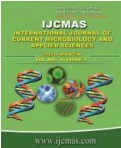


 National Academy of Agricultural Sciences (NAAS)
National Academy of Agricultural Sciences (NAAS)

|
PRINT ISSN : 2319-7692
Online ISSN : 2319-7706 Issues : 12 per year Publisher : Excellent Publishers Email : editorijcmas@gmail.com / submit@ijcmas.com Editor-in-chief: Dr.M.Prakash Index Copernicus ICV 2018: 95.39 NAAS RATING 2020: 5.38 |
Agriculture is the basis of rural economy and livelihood of developing nations where most of the farmers belong to small and marginal categories. Agriculture in developing nations had three contrasting divergence viz. Irrigated agriculture, Rainfed agriculture and Dryland agriculture, however, agriculture is considered as the best mean to reduce the rural poverty. According to Wikipedia, Poverty is not having enough material possessions or income for a person's needs. Poverty may include social, economic, and political elements. Sixty five per cent of the world’s hungry live in only seven countries – India, China, Democratic Republic of Congo, Bangladesh, Indonesia, Pakistan and Ethiopia. Ever since the independence, India has witnessed poverty and increasing population as the core and harsh challenge to act on. So, Government’s initial initiatives focussed on exploiting the potentials of agriculture to address the major and urgent need for food security that led to the introduction of Green Revolution during 1960s in the country. During this phase, the extension people acted as agents for technology transfer. As a result, India became self-sufficient in food grain reserves but still the condition of farmers were miserable. The following decades witnessed launch of several programmes for development with social justice for small and marginal farmers in particular and rural area in general, employment generations schemes for rural youth and women, etc. The extension system has played crucial role in agriculture and so is the extension professionals. They have assumed various roles from time to time and made a greater, efficient and valuable contribution in the changed scenario of demand driven to market driven agriculture. This paper briefs the changing role of pluralistic agriculture extension in agricultural growth and suggests the relevant policy implications.
 |
 |
 |
 |
 |